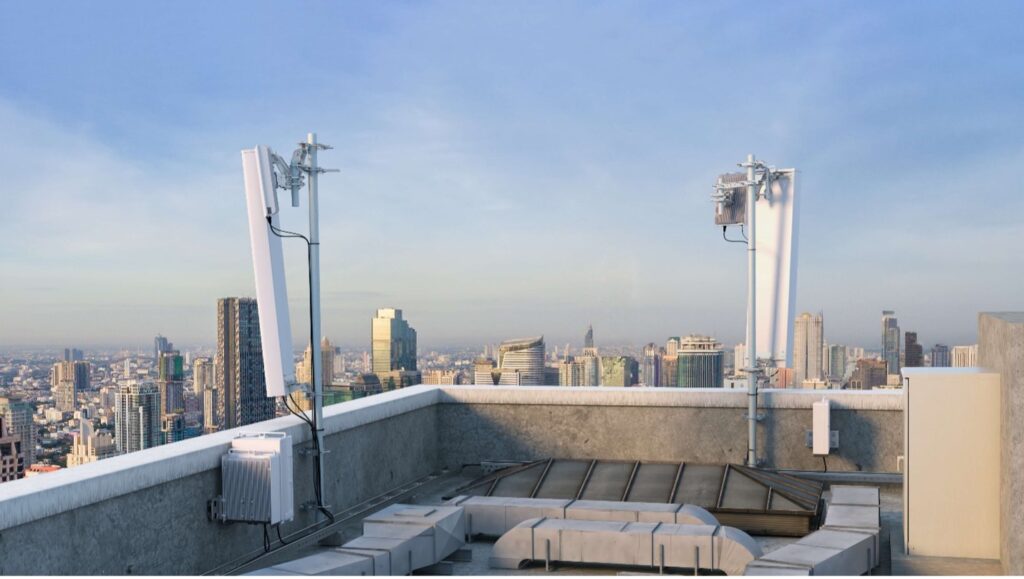The creation and evolution of open cellular standards:
Mobile systems function on a global scale. They are enormously complex. The standardization of the interfaces and functionality of these systems ensures that systems and components from different manufacturers interwork on a global scale. [1] For example, mobile system standardization enables the use of the same smartphone and SIM card in different countries and on different continents. Ericsson, working together with telecom operators, industries, and academia, has played a crucial role in developing standards for five generations of mobile systems meeting the needs of consumers, industries, and society as a whole.
Developing open standards encourages competition. They drive innovation, generate economies of scale, and enable consumers to benefit from constantly improving performance, choice, and price. Additionally, telecommunication standards enable the emergence of global, dynamic ecosystems of both local and global manufacturers, software developers, and system houses [2]. The open standards for global mobile systems from the 3rd generation onwards, are developed by the 3rd Generation Partnership Project (3GPP).
The 3rd Generation Partnership Project (3GPP) [3] specifications cover cellular telecommunications providing a complete system description for mobile telecommunications systems. 3GPP production of specifications and studies is contribution-driven by member companies. 3GPP is organised into Working Groups (WG) and Technical Specification Groups (TSG) which meet on a quarterly basis. The 3GPP standards are published and they are available free of charge on the internet.
Contributions to 3GPP standards based on IoT-NGIN work:
Based on the IoT-NGIN work on exposure of 5G device management capabilities, Ericsson prepared and submitted 3 change request contributions to 3GPP SA WG6 (Service and System Aspects Working Group 6) [4] [5] [6]. All change requests were approved by 3GPP. Two change requests have been published as enhancements to existing 5G standards in a Technical Specification [7]. The third change request will be published in a new Technical Specification. The contributions introduce new methods and solutions in 5G systems enabling secure and reliable data exchange between business actors from the same or different industries via 5G networks. The management of policies for data exchange is enabled using the new 5G-API exposing 5G device management capabilities.
Additionally, in the context of 3GPP SA WG5, Ericsson contributed to the preparation of a set of 3GPP SA WG5 contributions submitted by the European Utilities Telecom Council (EUTC) task force from the IoT-NGIN perspective, ensuring that the new standards from SA5 provide exposure of 5G capabilities in the network operations domain which are important for the work in IoT-NGIN on exposing network performance to a network application. 11 contributions were submitted by the EUTC task force in 3GPP SA WG5 at their quarterly meetings in May, August, and November 2022. All 11 contributions were approved by 3GPP SA5 and have been published as enhancements to already existing 5G standards.
Global market impact of the results: The publication of standards based on IoT-NGIN project work contributes to the better integration of the requirements of the IoT sector with the evolution of 5G cellular networks. Manufacturers and system houses around the world can now implement and market 5G products and services based on these published standards, ensuring the global availability of interoperable products and services based on the IoT-NGIN results. These products and services enhance the opportunities for IoT Smart City, Transport, Energy, and Industry system providers to base their market offerings on 5G systems. We have reduced the time needed for IoT system providers to bring their services to market. This has the effect of reducing the development costs of such IoT systems enabling better services to be offered to vertical sector customers.
References
[1] “The importance of standardization,” [Online]
[2] “Ericsson white paper: Open standards: together we innovate,” December 2019.
[3] “Introducing 3GPP,” [Online]
[8] “Setting standards,” [Online]
[9] “Standardization leadership in 3GPP Release 15 & 16,” November 2020.
[10] “Standardization leadership in 3GPP Release 17,” May 2022

